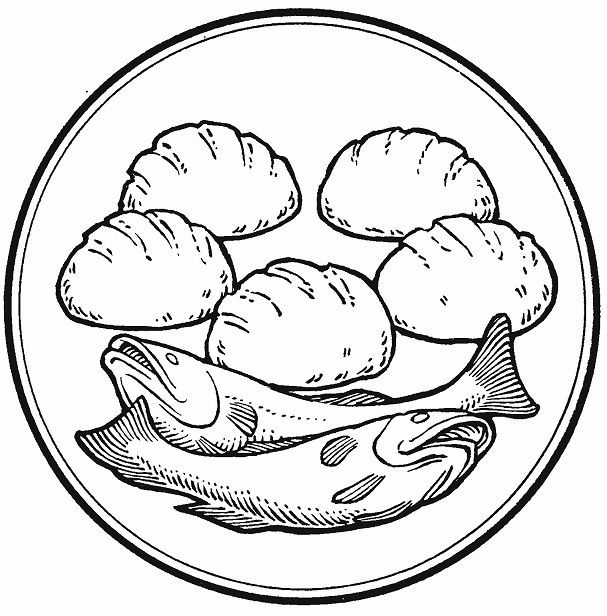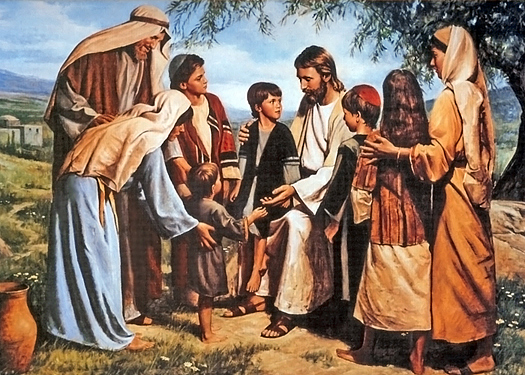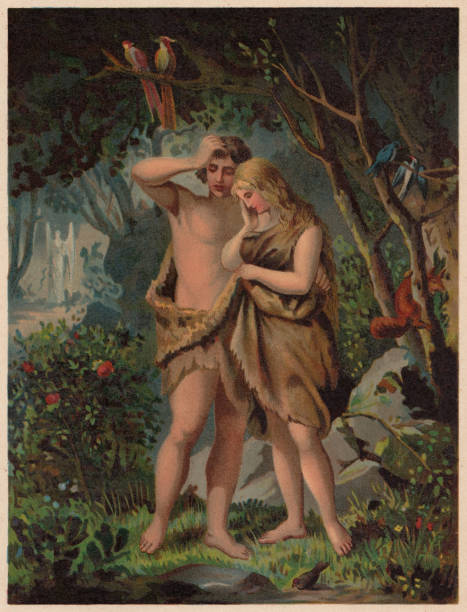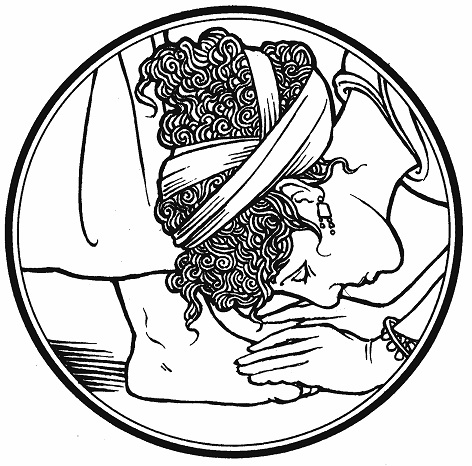Readings: Exodus 16:2–21 | Galatians 4:21-31 | John 6:1-15
Text: John 6:1-15

The name, Laetare, comes from the first word of the Introit, “Rejoice with Jerusalem, and be glad for her, all you who love her; that you may nurse and be satisfied at her consoling breast.”
It sounds great to invite people to rejoice, but let’s dwell there for a moment so that we learn the cause for rejoicing. These verses for the antiphon are at the center of a bigger lesson for today. (It might be helpful to open the pew Bible to this passage, so you can follow along better. Isaiah 66:7-13, page 625)
7“Before she was in labor she gave birth; before her pain came upon her she delivered a son. 8Who has heard such a thing? Who has seen such things? Shall a land be born in one day? Shall a nation be brought forth in one moment? For as soon as Zion was in labor she brought forth her children. 9Shall I bring to the point of birth and not cause to bring forth?” says the Lord; “shall I, who cause to bring forth, shut the womb?” says your God. 10“Rejoice with Jerusalem, and be glad for her, all you who love her; rejoice with her in joy, all you who mourn over her; 11that you may nurse and be satisfied from her consoling breast; that you may drink deeply with delight from her glorious abundance.” 12For thus says the Lord: “Behold, I will extend peace to her like a river, and the glory of the nations like an overflowing stream; and you shall nurse, you shall be carried upon her hip, and bounced upon her knees. 13As one whom his mother comforts, so I will comfort you; you shall be comforted in Jerusalem.
These verses fall in the midst of a controversy. It’s between those who tremble at the Word of the Lord, and those make themselves the Lord’s enemies. It would be easy enough if the God-fearing wore red arm bands while the haters of God’s Word wore white, but it’s not that easy. The controversy is between two groups which outwardly claim the Lord, His City, His Temple, and they allege to be His true people.
In that much, nothing has changed. Even a cursory glance at Church history will show parties who claim to have the right to the Name of God. How can this dispute be settled? That’s what this portion of Isaiah teaches us.

But some will object to reading all this into Isaiah. How can you say that Jerusalem stands for the Christian Church? I mean, it’s found on a map, and since 1947 it’s been part of a country called Israel! Doesn’t that mean that the city of Jerusalem holds some dear place in God’s heart, in His plan for the fullness of time?
St. Paul explains this, himself a Jew, one who had the highest regard for Jerusalem and the activity God was doing in the Temple and on Golgotha outside the city. Still, however, he comes back to the controversy of two parties claiming a place and, with that, claiming God’s blessing. The party claiming Jerusalem the city, the ancestry, the traditions, the Temple itself, are also saying that in order to be saved, you must obey at least some parts of the Mosaic Law. Yet in doing that—even though they are claiming the right of children of God with the outward trappings—they are insisting that their human birth and outward obedience to God’s commands gives them the right to become children of God. They are willing to fight those who claim, “to all who did receive him, who believed in his name, he gave the right to become children of God, who were born, not of blood nor of the will of the flesh nor of the will of man, but of God.” (John 1:12-13)
21 Tell me, you who desire to be under the law, do you not listen to the law? 22 For it is written that Abraham had two sons, one by a slave woman and one by a free woman. 23 But the son of the slave was born according to the flesh, while the son of the free woman was born through promise. 24 Now this may be interpreted allegorically: these women are two covenants. One is from Mount Sinai, bearing children for slavery; she is Hagar. 25 Now Hagar is Mount Sinai in Arabia; she corresponds to the present Jerusalem, for she is in slavery with her children. 26 But the Jerusalem above is free, and she is our mother. 27 For it is written, “Rejoice, O barren one who does not bear; break forth and cry aloud, you who are not in labor! For the children of the desolate one will be more than those of the one who has a husband.”

We’re naturally attracted to outward proofs, and that’s how God operated for Israel under Moses. He gave them outward signs: circumcision, the Temple rites, national borders, a city for His Name to dwell. But as is the case with sinful man, it was abused. Rather than be seen as an inexpressible gift for God, whom “heaven and the highest heaven cannot contain” (1 Kings 8:27)—for Him to locate His presence and bestow His undeserved favor upon the sons of Israel—it was turned into a source of pride.
But what’s needed is more than to say, you’ve got it wrong; now do this instead. God goes further by making it clear that those who are truly His people are not able to boast even of their faith. Listen to this analogy of birth: You are born of water and the Holy Spirit. You, the barren one, break forth and cry aloud even though you do not labor! And despite all the effort and alleged holiness, it’s the children of promise who are named before God. It’s the children who believe in the promised Son of God who are of the true Jerusalem. Those who are enslaved in the blindness of the old covenant—who actually hate the Word of God—are slaves in the present Jerusalem.
“But the Jerusalem above is free, and she is our mother.” This is where we properly call the Church our mother—not a human institution, but the work of God. You, hear the Word of God and keep it, who have the gift of faith in Christ, the Church is your mother.
So Paul continues,
28 Now you, brothers, like Isaac, are children of promise. 29 But just as at that time he who was born according to the flesh persecuted him who was born according to the Spirit, so also it is now. 30 But what does the Scripture say? “Cast out the slave woman and her son, for the son of the slave woman shall not inherit with the son of the free woman.” 31 So, brothers, we are not children of the slave but of the free woman.

One of the dreams of our age is for there to be peace in the Middle East. There actually hasn’t been outward peace in that region since the days of King David and Solomon, about three thousand years ago. But since the time when Christ was born, this is a major reason why: People are clamoring over the city of Jerusalem and claiming it as their holy site. Jews, Christians, and Muslims have all gotten wrapped up wanting to find God in a place.
Jewish Zionist movements of the 19th and 20th centuries certainly haven’t helped this either. The fruit of their labor is seen in the fact that a nation-state by the name of Israel exists today. It’s also believed by many Christians that rebuilding a brick-and-mortar Temple in Jerusalem—where the Muslim Dome of the Rock currently sits—will usher in the return of Christ.
Yet those who are still yearning for the earthly city are blind to the work which God actually is doing. Why long for the Jerusalem who rejected God’s Christ, because He did not bring a kingdom on their own terms, a salvation that could be worked for, and He made it dependent completely on divine work!
Let’s return to the antiphon from the beginning of service: “Rejoice with Jerusalem, and be glad for her, all you who love her; that you may nurse and be satisfied at her consoling breast.” Jerusalem is a picture of the Church, what we confess in the Creed as the Communion of Saints. Rejoice where the Church is, where she gives birth to sons and daughters who are “born, not of blood nor of the will of the flesh nor of the will of man, but of God.”

So if the present Jerusalem is a place of slavery, and the Jerusalem from above is free, who is our mother, where can we look for God in the world?
This we learn in the Feeding of the 5,000 which we heard from John 6 today. This miracle appears in all four Gospels. It richly reveals Jesus as the fulfillment of the ministry of Moses, the presence and provision of the Lord amid His people, and it affirms that man does not live by bread alone, but by every Word which comes from the mouth of the Lord [Deut. 8:4].
Consider the miracle itself, though: He sees the large crowd, and tests His disciples by asking, “Where are we to buy bread, so that these people may eat?” Philip gives the event-planner answer and says there isn’t a catering service or a budget in the world that could pull off suddenly feeding this multitude (Matthew tells us it was 5,000 men besides women and children). In the wilderness which prefigured this, God made the bread to appear on the ground in the morning. But where does the food come for this? From a boy “who has five barley loves and two fish.” He takes these, gives thanks for them and by these five loaves and two fish, He gave the people their fill. Let the words of Isaiah echo in your mind, “that you may nurse and be satisfied from her consoling breast; that you may drink deeply with delight from her glorious abundance.” That God in Christ will provide for His people.

God is located not simply in city, but where He puts His Word and promises His presence: Where the Church gathers and is bestowing His forgiveness, “there I am among them” (Matt. 18:20). Where disciples are born of water and the Spirit in the Name of the Father, and of the Son, and of the Holy Spirit, “behold, I am with you always, even to the end of the age.” (Matt. 28:19-20) Where, not the sacrifice of bulls and goats, but the Lamb of God is feeding His redeemed people, we rejoice in this reality that is known to faith from Hebrews 12:
22 But you have come to Mount Zion and to the city of the living God, the heavenly Jerusalem, and to innumerable angels in festal gathering, 23 and to the assembly of the firstborn who are enrolled in heaven, and to God, the judge of all, and to the spirits of the righteous made perfect, 24 and to Jesus, the mediator of a new covenant, and to the sprinkled blood that speaks a better word than the blood of Abel. (Hebrews 12:22-24)
All who believe in Christ, who hold fast in faith to God’s Word, are the true members of Zion, the heavenly Jerusalem. We don’t yet see these things, which is hard when we are being called pretenders by the unspiritual and deceived. Irish theologian J. Alec Motyer (1924-2016) explains:
Zion is looking forward to blessings still in store; to rejoice with Jerusalem is to share this forward look. To love her is to prize what she stands for: the city where the Lord dwells in holiness, mercy, and law. We are to live in the benefit of divine mercy, enjoy the richness of divine fellowship and fashion our lives in obedience to the divine word. To mourn over her is to lament the sins of the visible church, its shortcomings, its weakness and ineffectuality in the face of the world and the presence within of compromisers and apostates, but to do so as a fellow-sinner, longing for the blessings and the perfection yet to come.[1]
All these blessings are ours now, but our eyes will have to wait to see them. That’s why we can rejoice even now! Even under disappointments, suffering, and hoping for what is unseen. Beloved in Christ, believe the words and promises of God, and be consoled as children of God, nourished with the pure spiritual milk at the bosom of your mother, the Church. Your God will not fail to provide, and you will eat and be satisfied. Amen.

[1] Motyer, J. Alec. The Prophecy of Isaiah: An Introduction and Commentary. Intervarsity Press, 1993. pp. 537-38
























